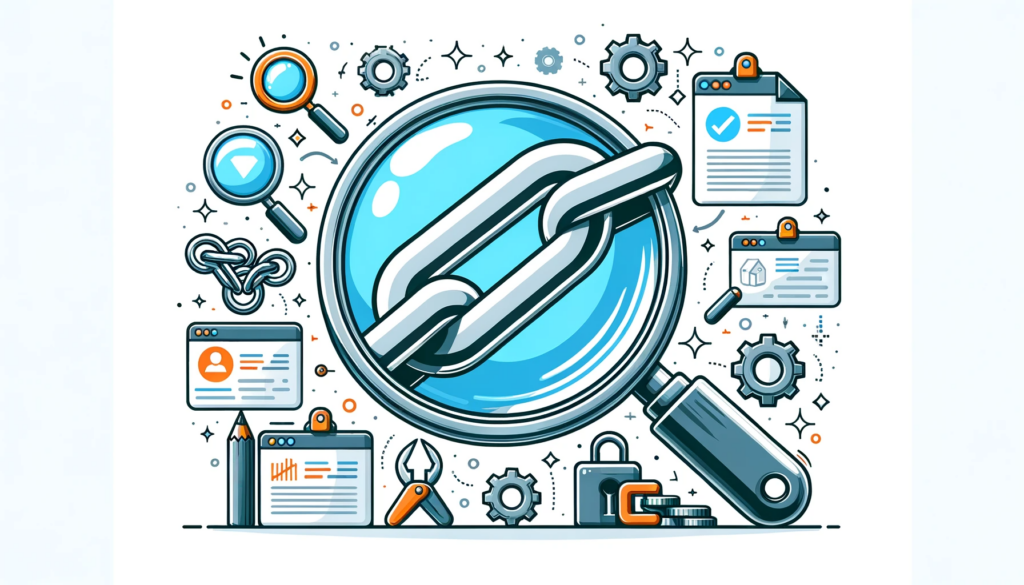In the digital world, visibility is key to success, and in the realm of SEO, backlinks are your spotlight. But what are backlinks, and why does everyone keep talking about them? In this guide, we strip away the technicalities and explore the fundamental concept of backlinks, ensuring you will be confident to start your own backlinking journey.
Back to Basics: Understanding Backlinks
Imagine the internet as an intricate map, with websites as destinations. Backlinks are the roads that lead to these destinations. Simply put, a backlink is a link from an external website that points to your website. This interconnectedness makes your site more visible to search engines, akin to having more roads leading to your destination, making it easier to find.

The Power of Backlinks for Your Website
Backlinks are like votes of confidence from other websites. They signal to search engines that others find your content valuable, credible, and worth referencing. This not only improves your website’s credibility but also exposes you to broader audiences through referral traffic, answering the pivotal question, “What are backlinks, and why are they important for my website?” There is a lot more to learn about the basics of backlink management in order to a grasp a full understanding.
Quality Over Quantity: The Types of Backlinks
Not all backlinks are created equal. High-quality backlinks come from reputable, authoritative websites and are contextually relevant to your content. On the flip side, low-quality backlinks originate from potentially untrustworthy sites and can harm your site’s reputation.
Characteristics of High-Quality Backlinks vs. Low-Quality Backlinks
| High-Quality Backlinks | Low-Quality Backlinks |
| Relevant to your content | Irrelevant to your content |
| Come from authoritative domains | Originated from low-authority or spammy domains |
| Contextually placed within the content | Randomly placed, often unrelated to the surrounding content |
| Add value to the reader | Created solely for the purpose of linking |
How Backlinks Influence Search Engine Rankings

Search engines like Google use complex algorithms to determine the order of the websites they display for a search term. Backlinks play a critical role in this process. Websites with more high-quality backlinks are generally perceived as more authoritative and trustworthy, ranking higher in search results.
How Backlinks Affect Rankings
| Number of Quality Backlinks | Estimated Domain Authority | Estimated PageRank | Search Engine Ranking Position |
| 0-10 | Low (0-20) | Low | Below top 30 |
| 11-50 | Moderate (21-50) | Moderate | Top 30 – 20 |
| 51-100 | High (51-70) | High | Top 20 – 10 |
| 101+ | Very High (71-100) | Very High | Top 10 |
Practical Tips for Assessing Backlink Quality

To ensure you’re gaining the full benefits of backlinks, it’s essential to assess their quality. Look for links from websites that are credible and authoritative within your industry. Ensure they are contextually relevant and consider the link type; ‘dofollow’ links pass on ranking power, while ‘nofollow’ links do not.
Checklist: How to Assess Backlink Quality
[ ] Check the domain authority of the linking website.
[ ] Review the relevance of the linking page’s content.
[ ] Ensure the link is contextually appropriate.
[ ] Verify the link is a ‘dofollow’ link.
Common Pitfalls and Mistakes to Avoid
In the race to acquire more backlinks, many fall prey to detrimental practices like buying links or engaging in excessive link exchanges. These methods, seen as manipulative by search engines, can lead to penalties, including lowering your site’s ranking or complete de-indexing.
Common Backlinking Mistakes to Avoid
1. Buying backlinks rather than earning them organically.
2. Participating in irrelevant link exchanges.
3. Using automated programs to create links.
4. Over-optimizing anchor text.
5. Ignoring the quality of outbound links.
Conclusion
Backlinks are the bedrock of your website’s visibility on the internet. By understanding what backlinks are, recognizing their power, and using them responsibly, you set the stage for your website’s success. As you embark on this journey, remember that authenticity and quality trump quantity every time. For more in-depth strategies or personalized guidance, don’t hesitate to reach out to Thai SEO Links– your beacon in the ever-evolving world of SEO.
Technical Terms
“Backlink”: A link from one website to another.
“Domain Authority (DA)”: A search engine ranking score that predicts a website’s ability to rank on search engine result pages (SERPs).
“PageRank (PR)”: An algorithm used by Google Search to rank web pages in their search engine results.
“Dofollow Link”: A hyperlink that allows search engines to pass on ranking power to the linked page.
“Nofollow Link”: A hyperlink that prevents search engines from passing on ranking power to the linked page.
